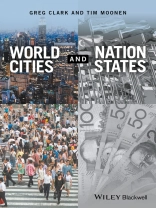World Cities and Nation States takes a global perspective to show how national governments and states/provinces/regions continue to play a decisive, and often positive, partnership role with world cities. The 16 chapter book comprised of two introductory chapters, 12 central chapters that draw on case studies, and two summary chapters – draws on over 40 interviews with national ministers, city government officials, business leaders and expert academics.
Mục lục
Foreword
Preface
Section 1
Chapter 1: Introduction
Chapter 2: Cities and nation states – the story so far
Section 2 World cities in tight nations: unitary systems in transition
Chapter 3: London
Chapter 4: Paris
Chapter 5: Seoul
Chapter 6: Tokyo
Section 3 Working remotely: world cities in federal systems
Chapter 7: Mumbai
Chapter 8: New York City
Chapter 9: Sao Paulo
Chapter 10: Toronto
Section 4: The mixed blessing of city-states and special status cities
Chapter 11: Hong Kong
Chapter 12: Moscow
Chapter 13: Shanghai
Chapter 14: Singapore
Section 5
Chapter 15: Adjusting to an age of world cities
Chapter 16: Unintended consequences: the outlook beyond world cities
Giới thiệu về tác giả
Greg Clark is an advisor and mentor for cities, business, and investment. He works with leadership in global cities, global firms, global institutions, and at global gatherings.Greg trained as an Economist, Social and Political Scientist, City & Regional Planner at Cambridge University, UK, Columbia University, NYC, and London School of Economics. Harkness Fellow and author of ten books and numerous reports and papers on cities and business development issues.
He has just been awarded the CBE.
Tim Moonen is a researcher on the future of cities and globalisation, and currently the Director of Research at The Business of Cities. He has written extensively about global urban financing, long-term strategic planning, and comparative city competitiveness. He has recently authored and co-authored original work on international development bank investment for cities, the future of European cities, and the concept of global fluency as a tool for city and metropolitan leaders.












